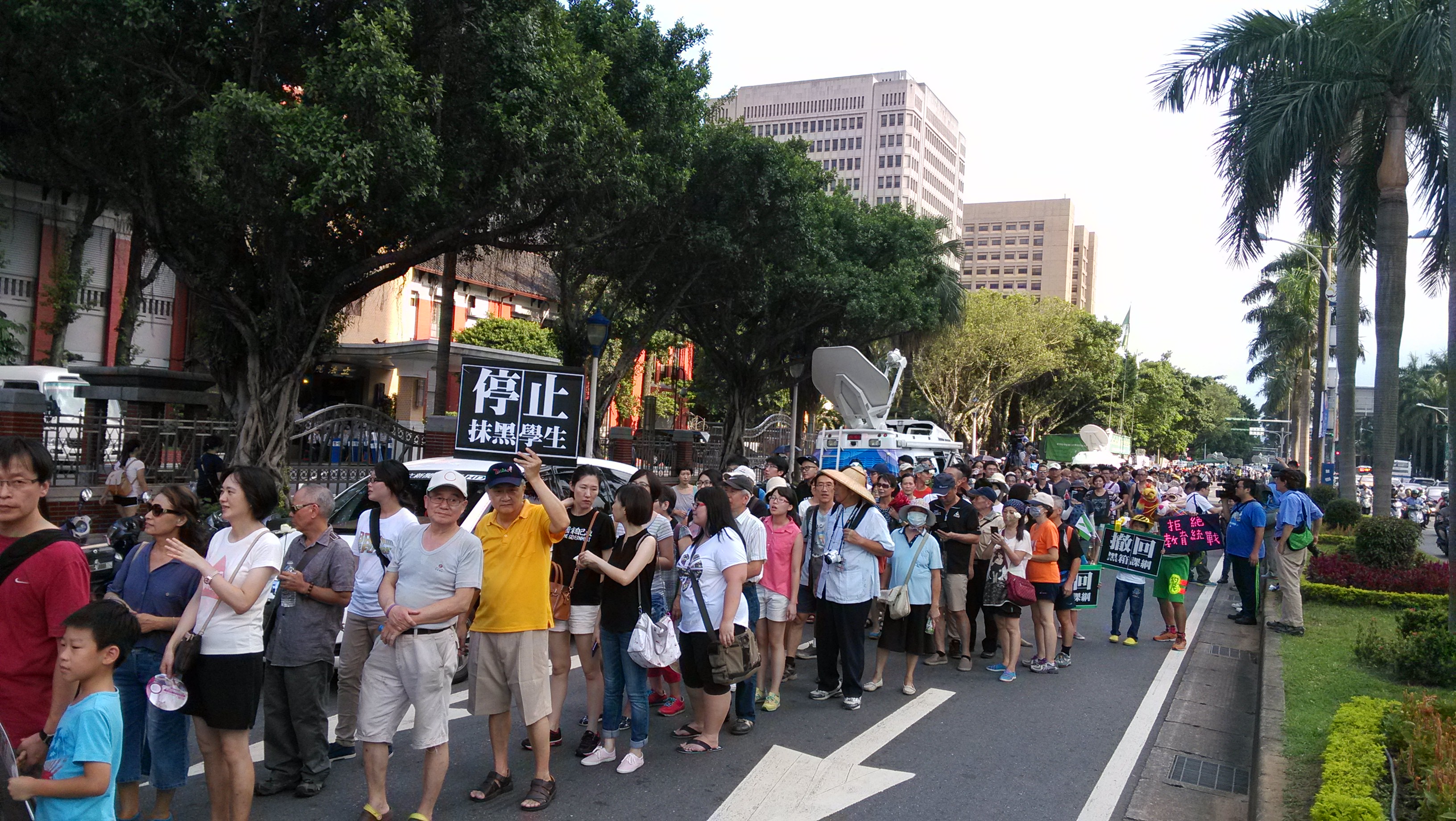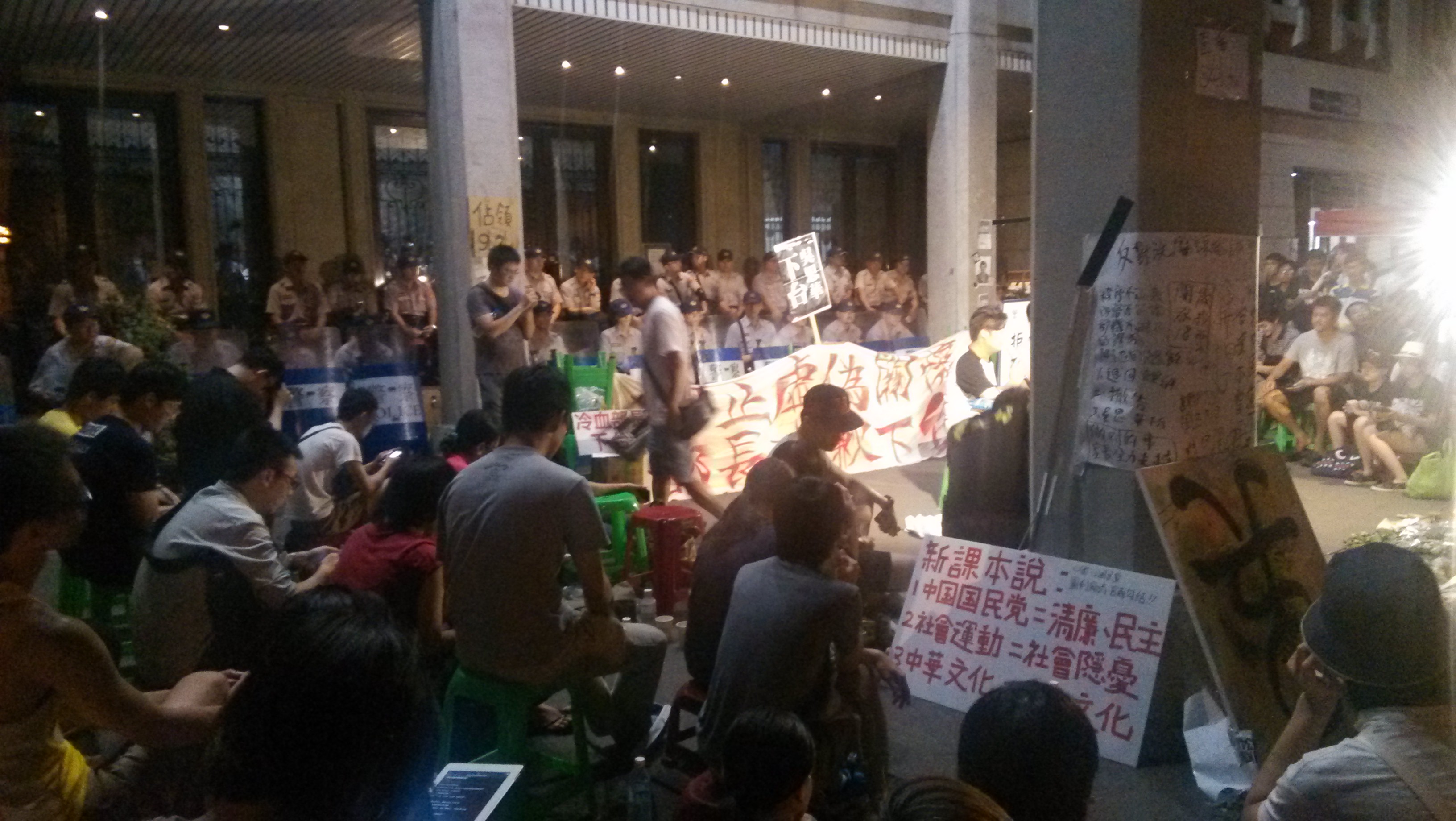by Brian Hioe
語言:
English /// 中文
Photo Credit: Brian Hioe
WHY ARE CERTAIN self-proclaimed members of Taiwan’s radical Left so afraid of the current anti-textbook revision movement? And in this case, it would look like the political Left is afraid of a bunch of children—high schoolers, that is. So very radical that is.
Going back to last year’s Sunflower Movement, once again we find ourselves in the situation where a small segment of the self-proclaimed Left backs away from a mass uprising of Taiwanese society, proclaiming it to be a mere expression of native Taiwanese nationalism against, for example, the mainland Chinese nationalism pushed for by the KMT. And to be sure, if this were so, that would be a valid critique of the movement—that is, if the movement were simply one nationalism versus another form of nationalism.
However, it would appear that such self-proclaimed Leftists would have never bothered to visit the current occupation site in the Ministry of Education courtyard, much less speak to any of the involved high school students. Protestors to date have actually emphasized that the point is not on a native Taiwanese sense of identity—as threatened by the attempts of textbook revisions to instill a mainland Chinese sense of identity—but that they oppose Han-centric nature of textbook revisions where it is that Taiwan has a pluralized sense of identity as a product of its history.
 March on the afternoon of August 2nd. Photo credit: Brian Hioe
March on the afternoon of August 2nd. Photo credit: Brian Hioe
What it would appear is that once again that these self-proclaimed members of the political Left, as betraying what at heart may be closeted pro-unification positions or a sense of cultural identity with China dressed up in the garb of Leftism, have appropriated the critique of nationalism for their own ends. To be sure, an exclusionary sense of Taiwanese identity, as defined strictly as native Taiwanese for example, the exclusion of Hakka, Aborigines, or the descendants of those that came from China, is problematic. But if it is that the political Left advocates for revolution as the mass uprising of society against the fetters of capitalism and other forms of oppression, these self-proclaimed members of the political Left find themselves strange position of positioning themselves against a mass movement—or at least, sneering at it from the sidelines.
To be sure, where such Leftists generally hail from self-proclaimed Marxist traditions, present protests fundamentally revolve around an issue not directly anti-capitalist in nature, or aimed at addressing economic inequality or anything of that sort. But is that cause to claim that the contents of the movement are fundamentally conservative in its content rather than, say, reformist in nature? That would seem to be the telling slippage made by such Leftists which is ultimately revealing of their true political views.
If the KMT’s undemocratic rule over Taiwan has been a form of class and racial oppression for so long, the rule of an elite economic class which was ethnic Chinese, the current textbook issue would be an attempt of the remnants of this former ruling class to force their vision of history upon all other residents of Taiwan—regardless whether of mainland Chinese descent, native Chinese descent, Aborigines, or “new immigrants”. So if such members of the political Left are willing to claim that the movement is just an example of nationalism, we might ask: what do they propose instead if in their view, the present movement is an example of “right-wing populism”? Side with the KMT?
Apart from that this attempt to dismiss the movement on the basis of the label that it is a form of right-wing populism again speaks to their utter lack of anything about the present movement, ready as they were to dismiss it from the get-go. This is probably on the basis of that at heart of any of their political beliefs is a quite often a sense of cultural identification with China rather than any real concerns drawn from Leftism. Actually, if so, one sometimes does wonder if these so-called Leftists would really just hope to force their own form of cultural identification upon the rest of Taiwan. And in this sense, are they really so different from the KMT? Even if the history of the pro-unification Left was its oppression by and resistance against the KMT, certainly it does appear nowadays that there quite often that there are disturbing parallels between them and the KMT where the overriding sense of identification with China above all other political views is concerned.
 Gathering on the night of August 3rd. Photo credit: Brian Hioe
Gathering on the night of August 3rd. Photo credit: Brian Hioe
If there is room for radical critique in this movement it is where the movement does, in fact, not go far enough. To begin with, the movement does not implicitly target the KMT but only speaks of the “black box” issue of textbook revisions that were undertaken under untransparent conditions—as though it were a simple matter of fixing the “black box” issue and then all would be fine rather than that what is a problem here is the systematic issue of the KMT and the means by which Taiwan is far from a democracy because of its dominance.
But moreover, the movement has not yet pointed towards how the set of interests which would lead the KMT to try to instill a Sinocentric form of education towards Taiwan’s youth and bring Taiwan economically closer to China are ultimately economic in nature—as rooted in the KMT’s nature as a political party of capitalists and colonizers. It is as such that one can yet oppose the KMT on grounds which are anti-capitalist in nature. What remains to be done is to point to how the ultimate problems of this movement, however indirectly it may appear, are rooted in international capitalism. Nevertheless, for some self-proclaimed members of the political Left, it would seem that it is more important to oppose the movement on what in the end is itself also a mainland Chinese form of nationalism—though a different from of mainland Chinese nationalism than that of the KMT—but dressed up as a form of Leftism.
Thanks to so many years of efforts by the KMT to stamp out Leftism, Leftism in Taiwan has always been rather weak. But efforts to win over a younger generation to Leftism will probably not gain a lot of traction if self-proclaimed Taiwanese Leftists are apparently so afraid of the current generation of youths in Taiwan. Perhaps this is revealing of the rather antiquated mentality of some of those who claim to be Leftists in Taiwan, even if they themselves—often in their twenties or early thirties—may not actually be so much older than current high school activists or last year’s Sunflower Movement activists. And maybe it is thanks to that old world mentality that Taiwan’s Left is quite often stuck in the past and is unable to move towards any sort of future.



